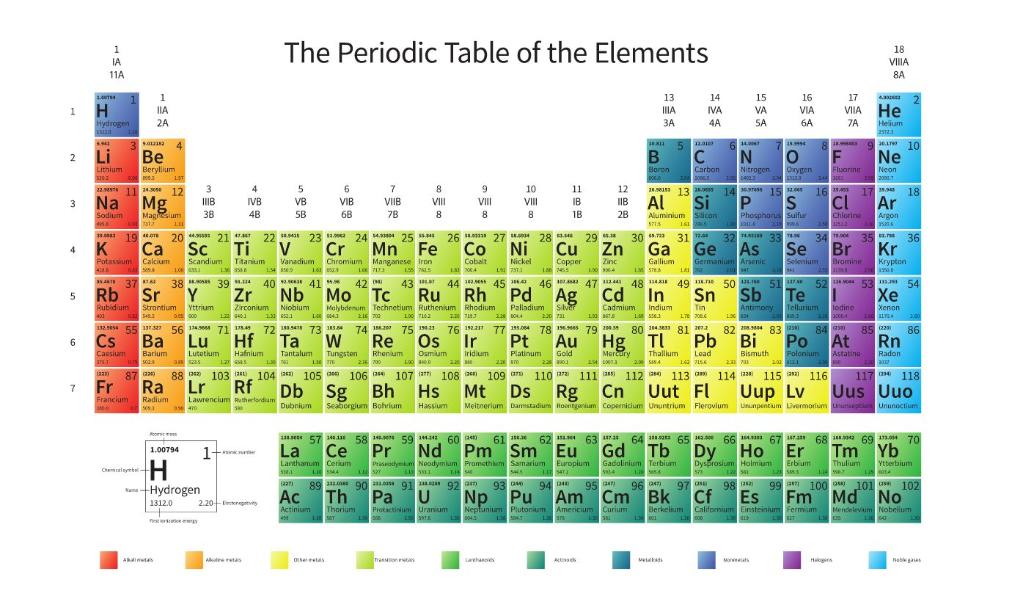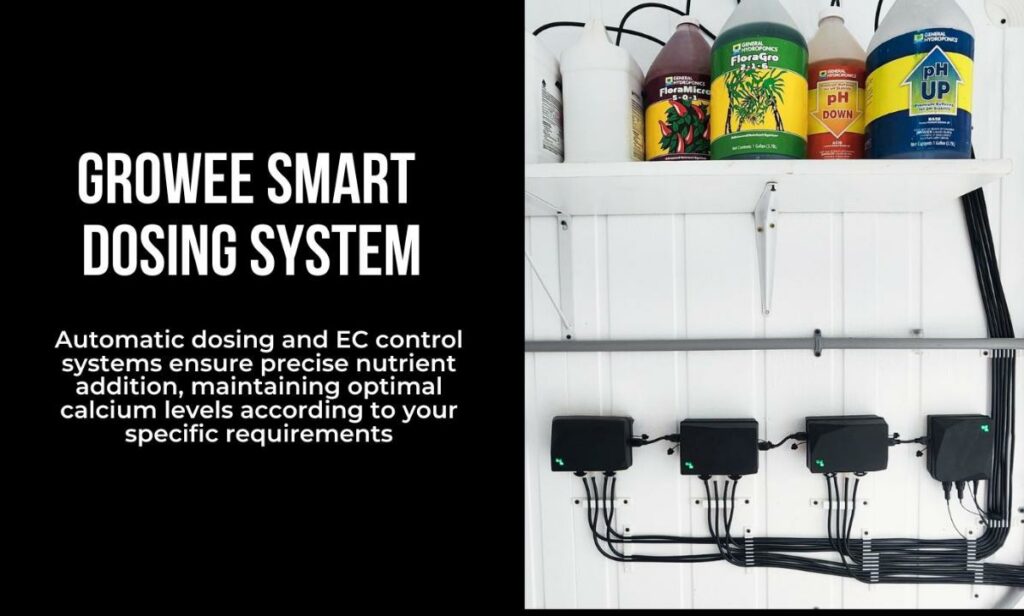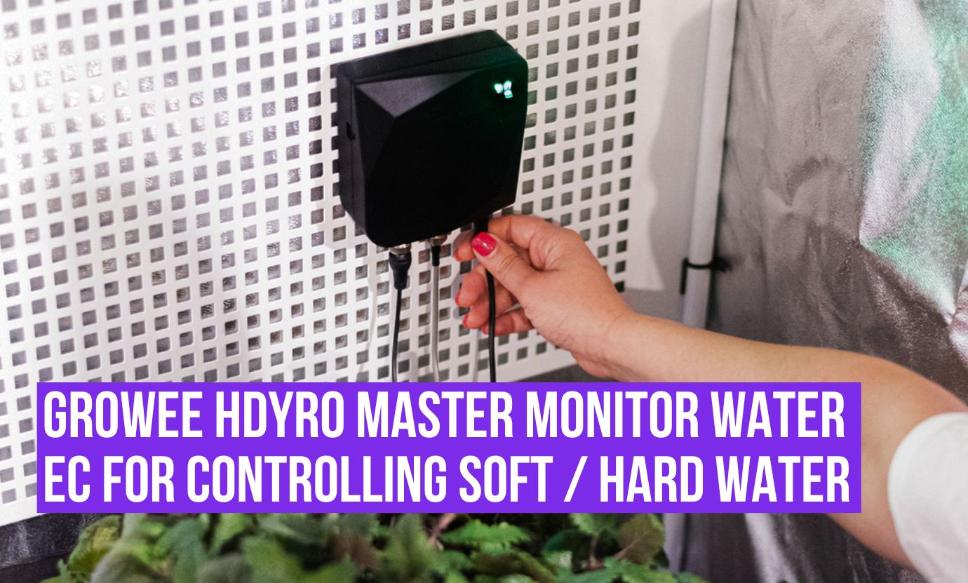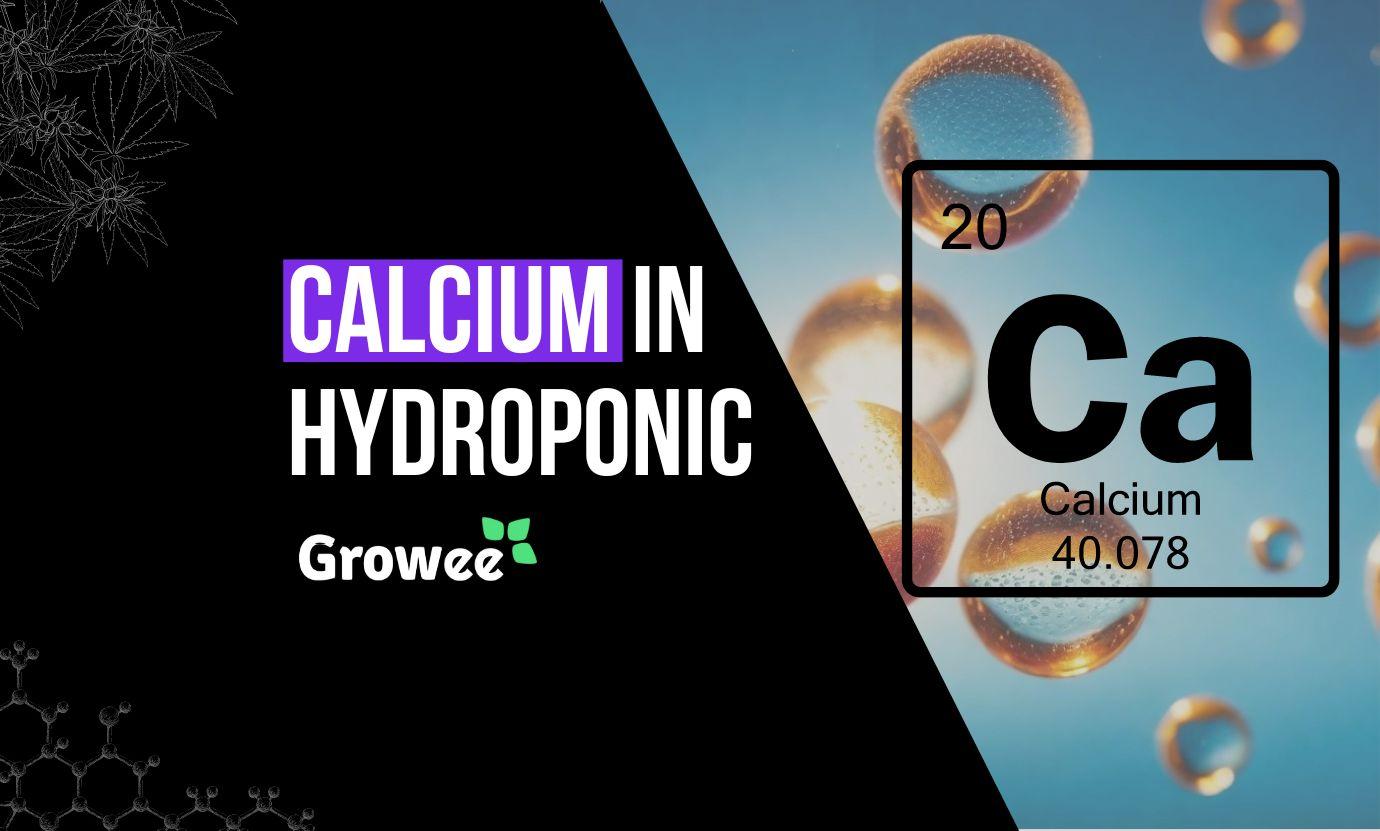Although not part of the big three, the NPK nutrients, calcium is nonetheless an important nutrient that hydroponic plants require to grow properly.
As you’ll see below, calcium plays several crucial roles in the growth and maintenance of healthy hydroponic plants, whether cannabis, tomatoes, herbs, or otherwise.
Having a calcium deficiency in your hydroponic feeding solution will have a bad impact on your plants and final yield, so avoiding it in the first place is the best course of action. Let’s cover everything there is to know about calcium deficiency in hydroponic plants.
Check out our article on hydroponic fertilizers to learn more about the difference between macro and microelements.
What Role Does Calcium Play in Hydroponics?
Calcium plays a variety of roles in the growth of plants, particularly in hydroponic systems, and here are the most important ones.
Nutrient Uptake
A vital role of calcium in plants is to allow for proper nutrient uptake and distribution. Calcium is required to maintain an optimal environment for the roots. This is a crucial nutrient as it helps plants absorb other important nutrients much easier, such as magnesium and potassium. Since hydroponics involves nutrients being delivered to plants through water, maintaining ideal calcium levels is therefore very important.
Plant Structure
In hydroponics, and in plant growth in general, calcium is required to produce the cell walls of the plant. Calcium pectate is a compound created by the formation of pectin and calcium, which in itself is vital for the overall strength, structure, and integrity of the plant cell walls. This is important for supporting large and heavy plant growth, as often occurs in hydroponics.
Plant Growth and Photosynthesis
In general, calcium is crucial for plant growth, as it aids in cell elongation and cell division, it helps regulate enzymatic activities, and is required for plants to engage in the metabolic processes that allow them to grow. Calcium is required for virtually every part of the hydroponic growth process, and this includes photosynthesis, which is how plants convert the food they uptake into the energy and substances they need to grow.
Immunity to Disease
Calcium is also important for preventing a variety of diseases from occurring in plants, diseases that are commonly associated with low calcium levels, such as tip burn and blossom end rot.

See How Growee Can Save You Time By Automating Your Plants Feeding
Water pH – Automated pH Up and Down Control
Nutrients Mixing – Automated Nutrient Dosing with Target EC / PPM Control.
Control From Anywhere – WiFi Connection and mobile App
Calcium Levels in Drinking Water
Many hydroponic growers use tap water for their systems, and calcium concentration varies with each water source. Some contain natural calcium, while in other cases, calcium is artificially added to the water. Here are some examples of calcium levels in tap water from several U.S. cities:
- Los Angeles, California: With its journey through limestone regions, Los Angeles tap water has higher calcium levels, typically ranging from 40 to 60 mg/L. This is quite beneficial for plant health.
- Miami, Florida: The water comes from the softer, limestone-rich Biscayne Aquifer and generally contains lower calcium levels, about 10 to 30 mg/L.
- Minneapolis, Minnesota: Sourced from the Mississippi River, Minneapolis water provides around 34 mg/L of calcium, offering a moderate level suitable for most hydroponic setups.
- Tampa, Florida: In Tampa, where the primary water source involves desalination, calcium is artificially reintroduced to achieve natural-like levels between 30 to 100 mg/L.
A unique case is Portland’s tap water is sourced primarily from the Bull Run Watershed, influenced mainly by rainwater and not groundwater. This results in very low calcium levels, often below 5 mg/L, which is exceptionally soft compared to other cities.
High Concentrations of Calcium Create Hard Water
Hard water is primarily caused by high concentrations of calcium and magnesium in the water. These minerals are naturally present in many water sources, especially in areas with limestone and chalk deposits.
As water moves through soil and rock, it dissolves small amounts of these minerals and carries them into the water supply. When the levels of calcium and magnesium are elevated, the water becomes hard.
Hard water can significantly impact cannabis grown in hydroponic systems by leading to mineral buildup, which can clog irrigation lines.
High concentrations of calcium and magnesium in the feeding solution can interfere with the plant’s ability to absorb other essential nutrients, potentially leading to deficiencies and imbalances in the nutrient solution.
For more detailed insights on the differences between hard water and soft water, and how each can affect your hydroponic systems, check out our article on the topic.

Symptoms of Calcium Deficiency in Hydroponic Grown Plants
There are several symptoms of a calcium deficiency in hydroponically grown plants, and they’re all quite easy to spot, so let’s take a look.
- If you notice that newer leaves look distorted or stunted, it could be due to a lack of calcium.
- Leaf necrosis may occur, which is when the edges and tips of leaves turn brown and wither away.
- If the ends of your fruits or buds start to turn black and rot, then your plants may be suffering from blossom end rot, which is a common occurrence when calcium deficiencies are involved.
- If you notice that your plants have weak root systems and do not appear to be very sturdy, this may be a result of a calcium deficiency.
- Leaves that are suffering from a calcium deficiency may also show signs of chlorosis or spotting, which is when the veins of the leaves stay green, but the rest turn yellow.
What Causes Calcium Deficiency in Hydroponic Plants?
There are several common causes of calcium deficiency in hydroponic plants, and determining what the cause is can help you find the adequate solution.
- The cause of the calcium deficiency may be as simple as you not providing your hydroponic plants with enough calcium to survive.
- Furthermore, if the pH of your nutrient solution is too high or too low, it will make the calcium unavailable to plants.
- If the water supplied to plants is not consistent, it may cause plants to not uptake nutrients properly.
- One of the most common causes of a calcium deficiency in hydroponics is competition from potassium. Without getting too technical, if there is too much potassium present, it can prevent hydroponic plants from absorbing calcium (and vice versa).
- If humidity levels are far too high, it can prevent hydroponic plants from taking up enough water, and therefore calcium.
Simple Ways to Add Calcium to Your Hydroponic System
For home or small-scale hydroponic growers looking to ensure optimal calcium levels in their water solutions, using pre-mixed fertilizers that include calcium is a practical and efficient approach.
One of the most popular additives is Cal-Mag, a supplement widely recognized for its effectiveness in balancing calcium and magnesium in hydroponic systems.
Cal-Mag is a commonly used supplement in hydroponics and gardening, designed to provide plants with essential calcium (Ca) and magnesium (Mg) nutrients.
For example, brands like Athena, Advanced Nutrients, and General Hydroponics offer their versions of Cal-Mag or similar products.
Treating Lacking Calcium
There are a number of methods at your disposal that can be used to treat a calcium deficiency in hydroponics plants.
- Make sure that the pH is between 5.5 and 6.5. Use appropriate equipment to monitor, test, and adjust the pH level as needed, as this will help make the calcium present in the water more available for update.
- The simplest method is to add more calcium into your watering solution, either calcium nitrate or calcium chloride, depending on whether or not you need the additional nitrogen.
- Make sure that there aren’t too many of the other nutrients present, such as potassium, which can outcompete calcium.
- For acute cases where immediate action is required, try applying a calcium foliar spray to the leaves of your plants, as this will allow for rapid absorption.

Preventing Calcium Deficiency
The best way to deal with a calcium deficiency in hydroponics is to prevent it from occurring in the first place, so let’s talk about exactly how to do that.
- The best way to prevent a calcium deficiency in hydroponic plants is to consistently monitor both EC and pH levels to ensure that they remain within the optimal range.
- If your tap water is soft, which means that it does not contain many dissolved minerals, you’ll need to regularly adjust it.
- Do your research and make sure that you are using hydroponic nutrients that contain significant amounts of calcium.
- Make sure that temperatures and humidity are kept at ideal levels, as this will allow for proper plant respiration, and therefore proper water and nutrient uptake.
How Do Growee Products Prevent Calcium Deficiency?
Growee products like the Pro Combo are invaluable tools for preventing calcium deficiencies. It’s able to accurately and consistently monitor both pH and EC levels, and can then automatically make adjustments based on your own predetermined levels. Growee products automatically compensate for nutrient imbalances, so you never have to worry about them occurring.
Conclusion
The bottom line is that Growee hydroponic monitoring and feeding systems are ideal if you want to prevent nutrient deficiencies such as calcium deficiencies from occurring. These are professional products designed to produce the best possible results when growing hydroponic plants.
FAQ
Which signs indicate that a plant is lacking Calcium?
Signs that a plant is lacking calcium include stunted growth, curled leaves, poor root development, the browning of leaves, and bud or fruit end rot.
How quickly will my plants recover from Calcium deficiency?
If the proper steps are taken, your plants should start to recover from a calcium deficiency within a few days of starting treatment.
How can I avoid Calcium deficiency?
To avoid a calcium deficiency, constantly monitor pH and EC levels, use high-quality sources of calcium, and maintain ideal growing conditions.
What happens when plants lack Calcium?
When a plant lacks calcium, it stops growing as quickly, its integrity weakens, it becomes susceptible to disease, it won’t be able to uptake nutrients properly, and may no longer be able to hold itself up.
How do you fix Calcium deficiency in hydroponics?
To fix a calcium deficiency in hydroponics, add more calcium into the nutrient solution and make sure that pH levels are optimal.
What is the best way to correct a Calcium deficiency in plants?
A fast way to correct a calcium deficiency in plants is to use a foliar spray, followed by applying calcium directly to the roots via the watering solution.
How does using the Growee pH controller for balancing the pH of water help with Calcium deficiency?
The Growee pH Controller helps by automatically testing pH levels and maintaining them between 5.5 and 6.5, thus allowing for calcium to be more readily available to plants.



